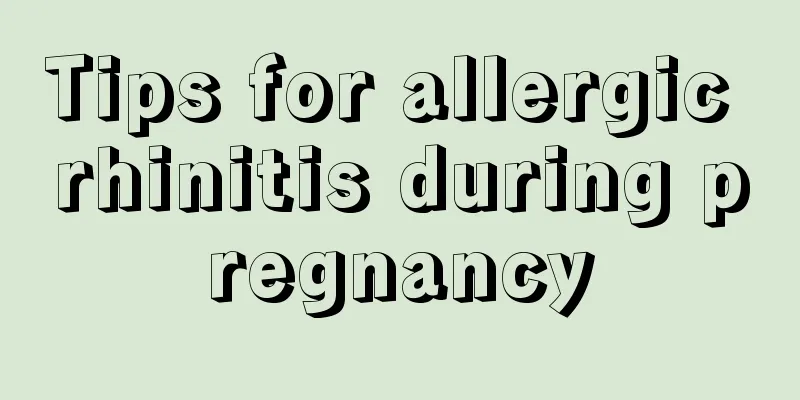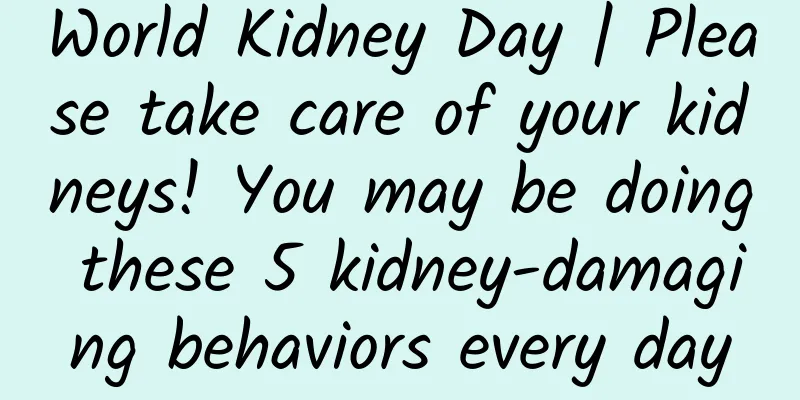Tips for allergic rhinitis during pregnancy

|
For patients with allergic rhinitis, once the disease enters its peak period, they will experience symptoms of sneezing or nasal discomfort. Severe patients can use medication to relieve the symptoms, but for pregnant mothers, once allergic rhinitis occurs, they cannot take medication during pregnancy. Are there any tips that can help pregnant mothers relieve discomfort? 1. Avoid contact with allergens (1) Reduce the number of dust mites in the room; maintain the relative humidity of the living space below 60%, but too low (such as below 30%-40%) will cause discomfort; sweep carpets; wash bedding and curtains. Mite allergens are soluble in water, and washing textiles can remove most of the allergens; use air purifiers and vacuum cleaners with filters. (2) Avoid allergens during the corresponding pollen allergy season. (3) Patients who are allergic to animal fur should avoid allergens. 2. Medication The following factors should be considered: efficacy, safety, cost/effectiveness ratio, etc. Intranasal and oral administration are commonly used, and the efficacy may vary between different patients. There is no long-term sustained efficacy after discontinuation of the drug, so maintenance treatment is required for persistent allergic rhinitis. Prolonged treatment does not lead to rapid drug resistance. Intranasal administration has many advantages. High concentrations of drugs can act directly on the nose, avoiding or reducing systemic side effects. However, for patients with other allergic diseases, drugs need to act on different target organs, and intranasal administration is not the best choice. Systemic drug treatment is recommended. Pregnant patients should use various drugs with caution. 3. Immunotherapy induces clinical and immune tolerance, has long-term effects, and can prevent the development of allergic diseases. Allergen-specific immunotherapy is commonly used by subcutaneous injection and sublingual administration. The treatment course is divided into a dose accumulation phase and a dose maintenance phase, and the total treatment course is no less than 2 years. Standardized allergen vaccines should be used. 4. Surgical treatment The indications are that the nasal congestion symptoms have not improved after medication or immunotherapy, there are obvious physical signs, and the quality of life is affected; there are obvious anatomical variations in the nasal cavity, accompanied by functional disorders; combined with chronic rhinosinusitis and nasal polyps, and drug treatment is ineffective. Surgical treatment is not a routine treatment for allergic rhinitis. |
<<: What medicine can cure bacterial vaginitis quickly?
>>: Signs of pregnancy after withdrawal bleeding
Recommend
Is it good for pregnant women to drink milk on an empty stomach?
Expectant mothers need to supplement a lot of pro...
What causes onychomycosis? How to prevent onychomycosis
Summer is the peak season for onychomycosis, and ...
Pregnant women's peroxidase antibody is more than 400
TPOA directly resists thyroid lactate dehydrogena...
What to do if you have fatty liver? Can it be reversed? Huaxi doctors: The key to daily conditioning is to do these two things!
Can fatty liver be reversed? How should I regulat...
Can I eat plums during menstruation?
The diet issue during menstruation is definitely ...
When a girl hugs a boy, will her breasts touch him? How do girls react when their breasts are touched?
When hugging my boyfriend, I am always afraid tha...
Ovulation test paper turns from strong positive to weak and then has sex
In order to have a successful pregnancy, we need ...
Why is a urinary catheter inserted during general anesthesia? Is a urinary catheter necessary during general anesthesia?
Anyone who has visited a patient in a hospital kn...
What if I don't have my period for 40 days?
What's going on if the menstrual period hasn&...
What is better to eat for women with constipation?
Constipation is something we often encounter. Alt...
What should I do if I have diarrhea during confinement?
It is very common for female friends to suffer fr...
Normal blood sugar range test for pregnant women
After a pregnant woman becomes pregnant, due to h...
Does taking emergency contraceptive pills work during ovulation?
It is not recommended to take birth control pills...
Girl's premonition of menarche
In puberty, women's uterine wall undergoes re...









